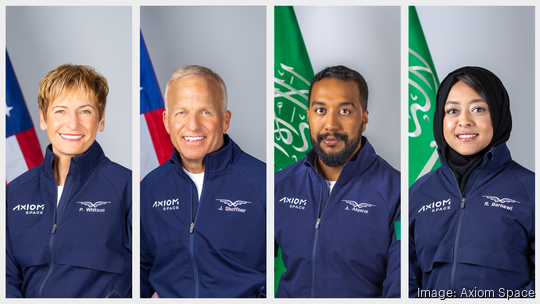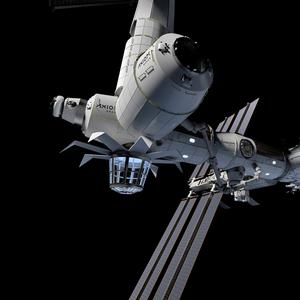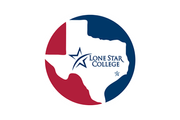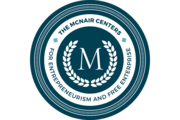
After two weeks of quarantine, Axiom Mission 2's four-person crew is ready to embark on a historic mission to the International Space Station.
During a May 16 press conference, the still-quarantined crew discussed the mission, which will launch May 21 from NASA's Kennedy Space Center in Florida.
Rayyanah Barnawi, one of the crew’s mission specialists who is on board as part of a partnership between Houston-based Axiom Space and the Kingdom of Saudi Arabia’s Saudi Space Commission, said the mission was a step forward for women in Saudi Arabia.
“I am proud to be part of this mission and to represent women in Saudi Arabia,” Barnawi said. “I am here because of the support of our government and the international cooperation between Axiom Space and NASA. We have lived the waves of excitement from everyone back home.”
Peggy Whitson, Axiom's director of human spaceflight and a former NASA astronaut, will lead the mission, joined by former aviator and entrepreneur John Shoffner as pilot. Barnawi and her compatriot Ali AlQarni are serving as mission specialists.
Whitson and Shoffner served as backup commander and pilot, respectively, on the company’s first mission, Axiom Mission 1, which was completed in April 2022. Whitson said Ax-1 commander Michael López-Alegría offered his own debriefing to the crew and discussed changes to the crew's training.
"We decided to go back to a shorter type of training, similar to what was done with the shuttles," Whitson said.
In addition to becoming the first woman commander of a private space mission, Whitson will have the chance to extend her record of the most cumulative time in space of any astronaut in the U.S. space program. Whitson’s previous missions to the International Space Station with NASA include Expedition 5 in 2002, Expedition 16 in 2007, and Expeditions 50 through 52 in 2016 and 2017.
Axiom’s missions are part of its long-term strategy of creating a low-orbit commercial spaceflight economy involving its planned Axiom Station, which the company has billed as the world’s first private, free-flying space station and as an eventual replacement for the ISS.
Saudi Arabia signed a partnership with Axiom for two seats on the Ax-2 mission in September 2022 as part of its own ongoing space strategy. Ax-2 will be the first private spaceflight conducted in partnership with a foreign country.
The four-person mission will spend 10 days at the International Space Station researching the effects of microgravity and radiation on materials. Saudi scientists on Earth will lead 14 of the experiments conducted in space, including several that will involve stem cells, Barnawi said during the press conference.
“I’ve worked on stem cells for 10 years on Earth, and now I get to work with them in space,” Barnawi said. “It will be exciting to see how they respond in a different environment and with different technology.”
Experiments will observe how cancer cells develop in lower-Earth orbit and how gravity affects the formation of cancers, Whitson also said. Additionally, Shoffner is working on a heart compression suit with the Massachusetts Institute of Technology that could help adapt the human physiology for spaceflight.
"The results of that experiment could be profound for the future of spaceflight," Shoffner said.
Ax-2 is the second of four flights performed in partnership with SpaceX, which will provide the Dragon spacecraft carrying the crew. Data and results from the four missions will be used in the creation of Axiom Station. Whitson described the Dragon spacecraft as user-friendly compared to her past experiences.
In preparation for Ax-2, the company partnered with local health care giant Houston Methodist to ensure the astronauts are physically conditioned. Axiom also consulted with Houston Methodist on the design of its new AxEMU spacesuit, which was produced under a $228.5 million contract from NASA for the agency's upcoming Artemis III mission.
On March 14, NASA also announced that Axiom Mission 3 will launch no earlier than November 2023 and is expected to spend 14 days docked to the space station.
Axiom is expanding its Houston presence with its new headquarters at the Houston Spaceport. The 22-acre Space Flight and Assembly Headquarters will be used to train private astronauts and to produce the Axiom Station. The headquarters broke ground in 2022 and is expected to be complete this year.
While the Spaceport project was underway, Axiom also leased a 146,000-square-foot former Fry’s Electronics building in Webster last year.





